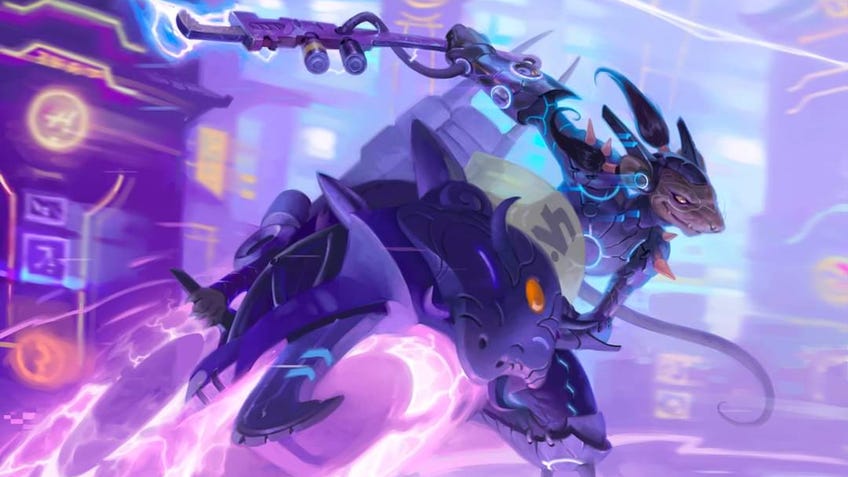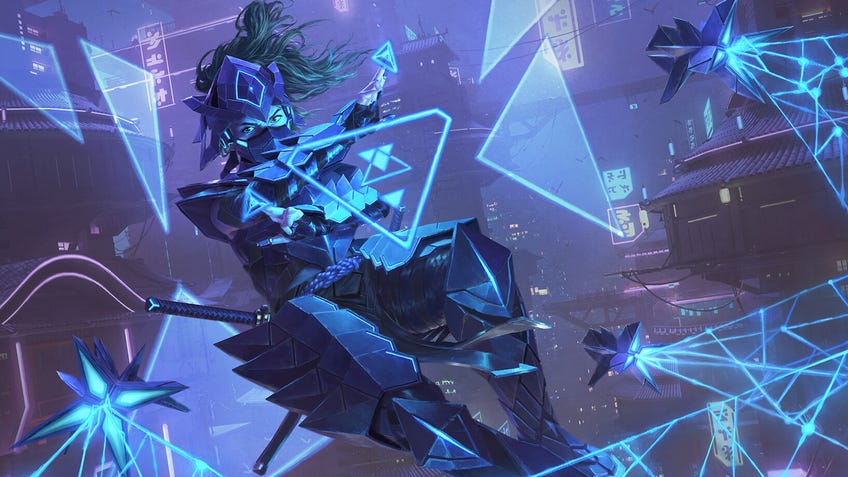Magic: The Gathering Arena is coming to Steam later this year, consoles in 2023
Couch-based card slinging.
Magic: The Gathering Arena, the digital client for the globally popular trading card game, is coming to PC this year and consoles as early as 2023. The news comes from MTG publisher Wizards of the Coast’s parent company Hasbro during its second quarter financial reports.
Hasbro CEO Chris Cocks dropped the information during a report to shareholders wherein he explained the disappointing quarter for the company’s digital revenue. One explanation he provided is the lack of a new release - the lukewarm reception of Dungeons & Dragons: Dark Alliance in June 2021 was better than nothing, but much of the success was attributed to Arena’s mobile launch during the same summer.
Despite the downturn, Cocks attested to Hasbro’s dedication to investing in digital games and almost incidentally mentioned that Arena would be arriving on the Steam video game marketplace by the end of the year. The company is planning to launch a console version on all major systems, likely meaning Nintendo Switch, PS5 and Xbox Series X.
Neither Cocks nor the other company spokespeople provided more specific information or dates. Bringing Arena to Steam feels like a no-brainer - the game was initially available on PC (and later, Mac) when it launched in September 2018. If Wizards of the Coast wants to keep growing its user base, selling it through the largest and most widely used storefront on the internet is a smart choice. Yu-Gi-Oh! Master Duel launched on Steam and exploded out of the gate with nearly 263,000 concurrent players at launch, though that figure has settled on an average 40,000 per day.
Moving to Steam will also give players and fans access to numbers Wizards of the Coast primarily isn’t too keen on divulging. Third-party sites such as SteamDB track a fair bit of information about each title on the platform, including player counts, Twitch statistics and review metrics. It wouldn’t show the whole picture in regards to Arena’s varying popularity within the MTG community, but it’s better than the current silence from on high.
How Arena will work on console remains a bit of an open question. That specific version will need to replace the mouse or pointer-controlled interfaces for a controller-compatible scheme. In addition to the workload of porting any title, developing console controls for the first time might explain the vague “sometime in 2023” release date Hasbro provided during the call.

Elsewhere in the quarterly report, Hasbro’s entire gaming portfolio grew 2% to a reported $528.3 million. The staggering number includes Magic: The Gathering along with Dungeons & Dragons products and board game mainstays such as Monopoly. MTG was a significant part of that growth, posting an 11% increase in revenue as Wizards of the Coast leans harder into the collectibility aspect with premium collector’s boosters for every set and a seemingly constant release of Secret Lair drops.
MTG’s success has continued throughout 2022 - Habsro reported that every card set released this year has earned at least $100 million, a baffling figure given how cramped the release schedule has been (and we’re only halfway through the year). The consistency of set performance likely played a large role (70 to 80% of total earnings large) in Wizards of the Coast posting its highest revenue quarter in the company’s history, according to Cocks. Global shipping delays be damned - tabletop hobbies still seem to be in a boom period for the largest player in the space.
It’s worth noting that the focus on revenue and sales is certainly the most important factor for Cocks, Hasbro’s leadership and the shareholders, but it doesn’t necessarily reflect on the overall health of the game. The glowing acclaim fans heaped on Kamigawa: Neon Dynasty flagged when the game moved to the gleaming, pulp-noir plane of New Capenna. And comparing Battle for Baldurs Gate to the most recent release, Double Masters, is a study in contrasts and extremes. Whatever the lessons we should learn from the past six months, Hasbro only seems to be hearing good news.
Don't forget to check-out our list of MTG Arena codes, and nab yourself a bunch of free boosters and cosmetics.

